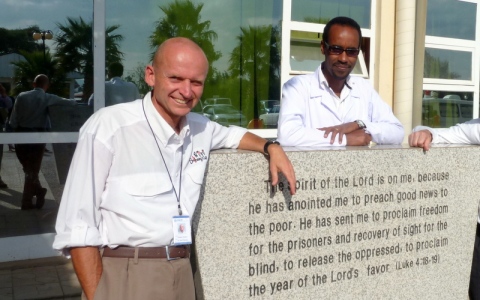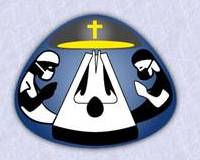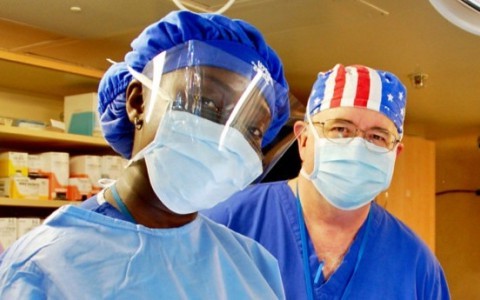EXCLUSIVE: Ethiopia’s first African-trained paediatric surgeon offers children a glimmer of hope
by - 27th March 2013

If not for Frehun Ayele, Fatima would still be wet with urine. The eleven-year-old native of war-torn Somalia traveled over 500 kilometers to Addis Ababa for an operation on her bladder, which was completely open to the skin since birth.
‘For children in need of surgery, it is a big challenge,’ Dr. Frehun told Lapido Media, describing waiting lists of over a year. ‘The most vulnerable in terms of disease severity, poverty, and distance, suffer much. Only the fittest survive.’
Frehun is unique as the first Ethiopian to be trained as a pediatric surgeon in Africa. Three months ago he halved the waiting list by opening the nation’s second pediatric surgery clinic, BethanyKids, in cooperation with the Korean-founded Myungsung Christian Medical Hospital.
‘Before the arrival of BethanyKids, there were three pediatric surgeons for over ninety million people,’ said Dr. Dan Poenaru, Frehun’s training surgeon and now partner in the clinic. ‘This simply means that the majority of children with surgical problems did not have access to specialized care.’
Poenaru is a veteran missionary and an adjunct professor of Surgery and Pediatrics at Queen’s University, Canada. For the last thirteen years he has worked closely with the Pan-African Association of Christian Surgeons (PAACS), an organization dedicated to the training and discipling of African surgeons to provide excellent, compassionate care to those most in need.
For sub-Saharan Africa, this is practically the whole continent.
According to World Health Organization recommendations, a nation should have at least one surgeon per 20,000 people. But the College of Surgeons of East, Central, and Southern Africa (COSECSA), with which PAACS partners, states their region has only one per 196,000.
This rate increases to one per 2.5 million in rural areas. Ethiopia has one per 205,000.
Viewed through a different metric, the poorest third receive only 3.5 percent of surgeries worldwide, according to the Lancet, a leading independent British medical journal founded in 1823. Their January 2012 editorial recommends a ‘move away from the paternalistic approach of parachuting in Western surgeons on brief missions and towards teaching skills to local surgeons.’
This is exactly the vision of PAACS.
 ‘We are not here to criticize the existing systems, pointing out their failures while exalting ourselves as the answer to the problem,’ said Dr. Paul Gray, PAACS program director for Ethiopia, resident in the country since 2007 with his wife and two children.
‘We are not here to criticize the existing systems, pointing out their failures while exalting ourselves as the answer to the problem,’ said Dr. Paul Gray, PAACS program director for Ethiopia, resident in the country since 2007 with his wife and two children.
‘The challenges of medical and surgical care in Africa are huge and multifaceted. I suspect the best way forward is to be found working together in collaboration.’
Gray helped arrange the exchange of residents with the national training center in Addis Ababa University, which is open to students of all faiths. But according to Dr. Bruce Steffes, the executive director of PAACS, it may have been the organization’s Christian commitment which made the difference.
Speaking with a particular government minister who was suspicious of the missionaries, Steffes pointed out all twenty-eight PAACS graduates were serving in their local context, often in rural areas.
‘I may have influenced his decision,’ he said, ‘by pointing out that their desire to serve Jesus is what motivates them to serve in those areas.’
This is a major issue in African surgery, according to Dr. David Thompson, who co-founded PAACS in 1996 after twenty years of medical missionary work in Gabon. Today, forty-four residents are in training in seven hospitals across the continent.
‘Many of the brightest and best medical students leave for training abroad, but after five years of training put down roots and stay there,’ he said.
Thompson said there is a greater than ninety percent attrition rate, a significant brain drain costing Africa the surgeons it needs. Even for those who do return, he says, most cannot function for more than a few years, as they were trained in ideal conditions in the West.
‘We train them in these resource poor environments,’ Thompson said, ‘so they know how to operate here.’
But if the resources are poor, the training methodology is state-of-the-art. PAACS follows the North American model where surgeons assist their trainees, who join in over 1,500 operations during a five year term.
‘We give them the scalpel and guide them through the operation,’ he said. ‘This is unique in most places in Africa.’

The result is a dramatic improvement in the lives of Ethiopian children, accomplished through Western-African partnership.
‘The quality of PAACS training is obvious all over Africa,’ said Frehun, whom PAACS aims to replicate in 100 total graduates by 2020.
To accomplish this, PAACS relies on volunteer doctors, who supply over 2,500 man-days of labor per year. They also require funds, seeking to grow their meager budget of US$580,000.
But for Steffes, there is no better investment.
‘For the price of supporting one North American missionary for one year,’ he said, ‘we can train an African physician for five years.
‘They will stay in Africa, caring for the bodies and souls of their own people for a lifetime.’
- Log in to post comments
